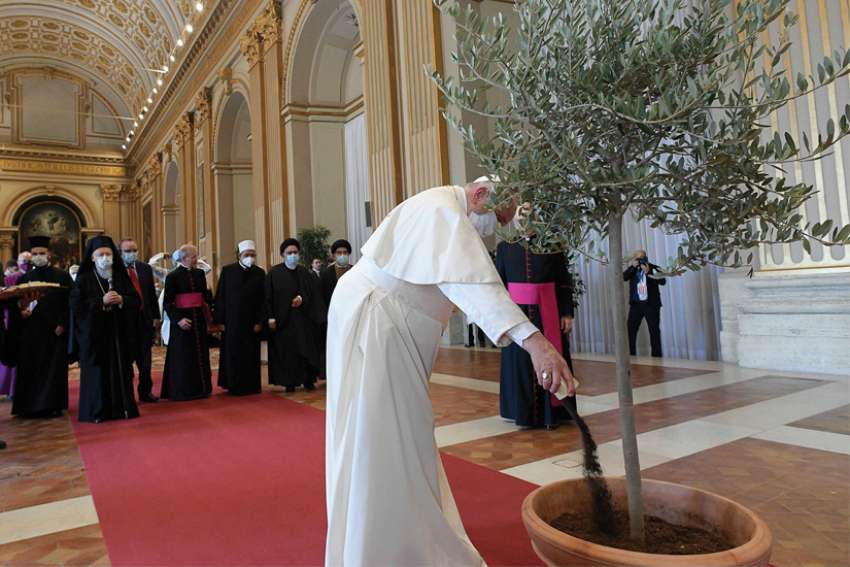To the strains of Antonio Vivaldi’s “The Four Seasons” and surrounded by potted greenery and the colourful frescoes of the Hall of Benedictions, nearly 40 faith leaders signed a joint appeal that Pope Francis then blessed and gave to Alok Sharma, president-designate of COP26, and to Luigi Di Maio, Italy’s foreign affairs minister.
“Future generations will never forgive us if we miss the opportunity to protect our common home. We have inherited a garden: We must not leave a desert to our children,” said the appeal, signed Oct. 4, the feast of St. Francis of Assisi, patron saint of ecology.
The appeal urged world leaders, who will meet at the 26th UN Climate Change Conference of Parties — COP26 — in Glasgow Nov. 1-12, “to take speedy, responsible and shared action to safeguard, restore and heal our wounded humanity and the home entrusted to our stewardship.”
Participants included top scientists and major religious leaders including: Ecumenical Patriarch Bartholomew of Constantinople; Anglican Archbishop Justin Welby of Canterbury, England; Russian Orthodox Metropolitan Hilarion of Volokolamsk, representing Patriarch Kirill of Moscow; Sheikh Ahmad el-Tayeb, grand imam of Al-Azhar; Rabbi Noam Marans of the International Jewish Committee for Interreligious Consultations; and top representatives of other Christian denominations, Sunni and Shi’a Muslim communities, Judaism, Hinduism, Sikhism, Buddhism, Confucianism, Taoism, Zoroastrianism and Jainism.
The appeal called on nations to: increase their levels of commitment and international co-operation; meet net-zero carbon emissions as soon as possible as part of efforts to mitigate rising global average temperatures; step up climate action at home and financially assist more vulnerable countries in adapting to and addressing climate change; increase their transition to cleaner energy and sustainable land use practices; and promote environmentally friendly food systems and the rights of Indigenous peoples and local communities.
The religious leaders symbolically marked their personal commitment by pouring a cup of soil onto a potted olive tree that will be planted in the Vatican Gardens.
The representatives took to the floor with a brief speech, with many detailing what their faith tradition teaches about the moral imperative of caring for humanity’s common home. Saying he wanted to leave more time to hear from everyone, Pope Francis chose to skip reading his speech aloud since everyone had a written copy.
In the full text, the Pope said COP26 “represents an urgent summons to provide effective responses to the unprecedented ecological crisis and the crisis of values that we are presently experiencing, and in this way to offer concrete hope to future generations.”
He proposed “three concepts” to guide their joint efforts: “openness to interdependence and sharing; the dynamism of love; and the call to respect.”
“Recognizing that the world is interconnected means not only realizing the harmful effects of our actions, but also identifying behaviours and solutions to be adopted, in an attitude of openness to interdependence” and sharing the responsibility and ways to care for others and the environment, he wrote.


